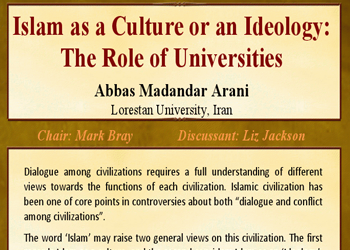Speaker: Abbas Madandar Arani
Chair: Liz Jackson
Dialogue among civilizations requires a full understanding of different
views towards the functions of each civilization. Islamic civilization has
been one of core points in controversies about both “dialogue and conflict
among civilizations”.
The word ‘Islam’ may raise two general views on this civilization. The first
regards Islam as a culture, and the second considers Islam as an ‘Ideology’.
These two views entail different social and cultural implications.
Universities can promote one of the two aforementioned views. Taking a
cultural view towards Islamic civilization, universities can strengthen an
intellectual relationship between civilizations. Alternatively, promotion of
an ideological view increases the conceptual distances and gapes in
understanding between Islamic civilization and other civilizations.
The presentation will first explain these two views, and will then indicate
different functions of universities and other higher education centres in
some Islamic countries.
Abbas Madandar Arani received his PhD from Mysore University, India,
and is now an Assistant Professor in the Department of Education at
Lorestan University, Iran. His research and teaching interest is in the field
of comparative education, with particular focus on education reform,
globalization and internationalization, religion and schooling, and
educational management and leadership.














